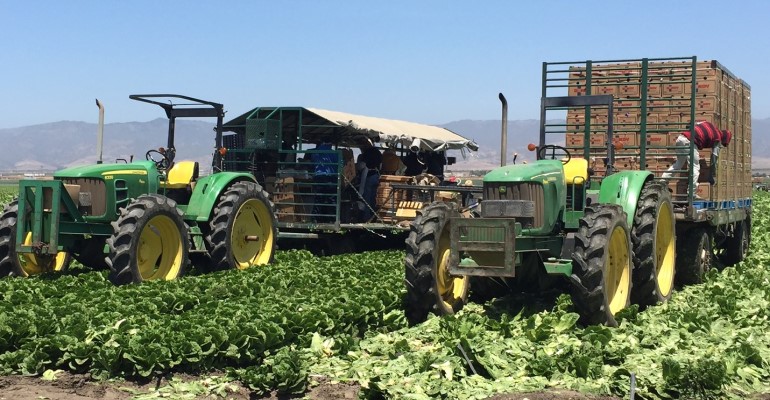FSMA gives FDA authority to force a recall after responsible party is given a chance to conduct a voluntary recall.

The Centers for Disease Control & Prevention (CDC) announced that romaine lettuce is unsafe to eat in any form in response to a new outbreak of illnesses causes by a dangerous form of Escherichia coli. Thirty-two illnesses have been reported from 11 states, with 13 people hospitalized. One person developed hemolytic uremic syndrome, a type of kidney failure. No deaths have been reported.
The current outbreak is not related to a recent multistate outbreak of E. coli O157:H7 infections linked to romaine lettuce. Ill people in this outbreak were infected with E. coli bacteria with the same DNA fingerprint as the E. coli strain isolated from ill people in a 2017 outbreak linked to leafy greens in the U.S. and to romaine lettuce in Canada.
"A recall of this magnitude, especially during the holiday week, will impact not only romaine but other leafy-green vegetables such as spinach. Retailers will be pulling romaine and possibly all other lettuce/leafy greens from their shelves (a process called quarantining) until the source is found," said Michael Droke, a partner at the international law firm Dorsey & Whitney devoted to the areas of agriculture and cooperative law and in the food and agriculture industries.
He said while this recall appears to be voluntary, the mandatory recall authority the Food & Drug Administration was given this month under the Food Safety Modernization Act (FSMA) is an additional nudge for retailers to move swiftly on their own.
Droke explained that FSMA "overhauled the nation’s food safety systems for the first time in over a generation. Among other changes, the food safety law gave the federal Food & Drug Administration mandatory recall authority for foods if there is a reasonable probability that the food is adulterated or misbranded and that the food could cause serious illnesses or death. Put another way, the FDA was given authority to force a recall even if the retailer, supplier or producer wanted to avoid it. The FDA must allow the responsible party to conduct a voluntary recall before ordering a mandatory recall. Prior to the FSMA, the FDA could only rely on manufacturers to voluntarily recall certain potentially harmful food products.
"The FDA’s mandatory recall authority applies to all foods (other than infant formula) that are manufactured, processed, packed or held at a food facility subject to the Food, Drug & Cosmetic Act. It applies to all food for humans, animals and the ingredients that go into that food. Infant formula has its own recall requirements under a different law," Droke added.
"Before the FDA can use its mandatory recall authority, the FDA must make a determination that there is a reasonable probability that the food is adulterated or misbranded. The FDA must also make a determination that there is a reasonable probability that using or exposure to such food will cause serious adverse health consequences or death to humans or animals (in a tongue twister, referred to a “SAHCODHA” hazard)," Droke said.
Once FDA has determined that the criteria for a mandatory recall have been met, FDA must provide the responsible party with an opportunity to voluntarily cease distribution and issue a voluntary recall. “The FDA will notify the responsible party of this opportunity in writing. If the responsible party refuses or does not voluntarily cease distribution and recall the article of food within the time and manner prescribed by the FDA, the FDA may order the recall. The FDA must also allow the responsible party to request an informal hearing to be held within two days after the order is issued," Droke said.
"The FSMA mandatory recall authority gives teeth to the FDA’s enforcement right. This agency's guidance helps employers understand when that authority will be used and will encourage companies to voluntary recall products to avoid a mandatory sanction. Food and ingredient companies should prepare in advance for the need to recall their products to minimize the risk of a mandatory order," Droke said.
Rep. Rosa DeLauro (D., Conn.) who serves as chair of the Congressional Food Safety Caucus, said more needs to be done to protect consumers.
“This is the third E. coli-related outbreak linked to romaine lettuce just this year. That is unacceptable. While I welcome the broad announcement from the CDC to warn consumers to avoid eating romaine lettuce in all forms, the agency and FDA have clearly not learned their lesson from previous outbreaks. We must do better,” DeLauro said.
“Instead, the Trump Administration has shown that food safety is not a priority by delaying crucial provisions of the Food Safety Modernization Act — like the produce safety rule — and shortchanging food safety resources through their budget requests. Making food safety a priority would be a significant step toward ensuring the food Americans buy and feed to their families is safe,” she added.
About the Author(s)
You May Also Like




.png?width=300&auto=webp&quality=80&disable=upscale)
